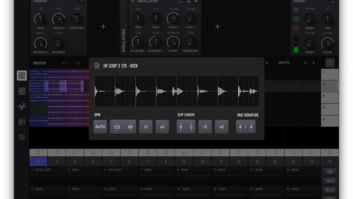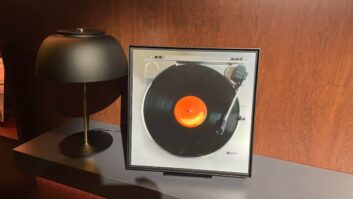A copyright-infringement lawsuit filed in federal district court, here, by the music industry charges XM Satellite Radio with turning its radio service into a music-download service without authorization and without paying higher royalty rates required under copyright law.
The suit cites Pioneer’s Inno, a headphone stereo radio that receives live XM broadcasts, records blocks of XM programming like a DVR, and lets users select individual songs from the broadcasts to keep in memory for as long as their XM subscription is current. Like an MP3 player, it also stores music files transferred from a PC.
The music companies not only contend that XM is not authorized to “distribute” music under its current license agreement but that it is actually competing unfairly with the music companies in the sale of digital music downloads.
XM said it will fight the suit, which seeks:
- a permanent injunction preventing XM from enabling the “disaggregation” of individual songs from a recorded block of programming. The companies contend XM can remotely turn the function off by sending a command over the air.
- $150,000 in maximum damages allowed by law for each song recorded by the Inno and similar devices. The industry contends XM could find out how many songs have been recorded by individual Inno owners if the owners dock the device to an Internet-conncted PC.
- unspecified punitive damages.
The suit does not specifically seek to keep the Inno or other devices like it off the market, nor does it state any intention by the music industry to sue subscribers who use the disaggregation feature, although the suit contends those subscribers are breaking the law.
“XM is playing a legal shell game by trying to morph a broadcast service into an ownership device,” the Recording Industry Association of America (RIAA) said in a statement. “They are attempting to compete with an iTunes or Rhapsody model while bypassing the compensation made by those and other services to the music community.”
The suit itself contends that XM’s “librarying function … does not have substantial or commercially significant non-infringing uses” that might protect it under court precedents.
XM shot back by calling the Inno and similar devices “legal devices that allow consumers to listen to and record radio just as the law has allowed for decades. The music labels are trying to stifle innovation, limit consumer choice and roll back consumers’ rights to record content for their personal use.”
XM also called the suit “a negotiating tactic on the part of the labels to gain an advantage” in the current round of royalty negotiations with XM. “XM Radio is the largest single payer of digital music broadcast royalties, and royalties paid by XM go to the music industry and benefit artists directly,” the satellite broadcaster noted.
The Consumer Electronics Association (CEA) rose to XM’s defense, with government affairs VP Michael Petricone charging that “the record industry is trying to block private, noncommercial recording off the radio— an activity which Americans have enjoyed for decades, has always been considered legal, and in this case has been expressly recognized by Congress, in the AHRA (1992 Audio Home Recording Act), as protected from lawsuit.
“The record companies cut a deal, embodied in legislation, which said digital audio recording devices are legal if they do not allow copies of copies,” Petricone continued. “And, throughout their pursuit of the Grokster case, the labels insisted that they had no intention of threatening the sort of in-home, private, noncommercial recording enabled by the devices under question in this suit.”
Petricone said the music industry “seems to have developed amnesia about the AHRA into which we and they had substantial input. Under this law, there is no doubt that the satellite recorders at issue in this lawsuit are legal.”
The recorder in question, Pioneer’s Inno, “transforms blocks of broadcast programming into playlists of disaggregated individual tracks,” the RIAA complained in a statement. “Without ever listening to programming, a subscriber can scroll and click through a playlist, selecting which songs to keep in a permanent library and which ones to delete, thus accumulating digital copies of an artist’s entire catalog in a few short days without paying a cent.”
Likewise, the Inno can be programmed to search for a particular artist or song and alert the subscriber when a song is broadcast. The entire song can then be recorded as it is playing, even if a subscriber hits the record button after the song has begun.
Similar recording capability is packed into Samsung’s Nexus, which began shipping last week. It’s an MP3 player that stores XM broadcasts when docked with a home docking station incorporating XM tuner. Samsung’s version of Pioneer’s Inno — called the Helix — ships to retail this week.
While it pursues its case in court, the music industry is shepherding legislation in the Senate and House of Representatives to force satellite radio broadcasters XM and Sirius to limit consumers’ ability to record satellite radio programming and raise the royalties that the companies pay to copyright holders.













